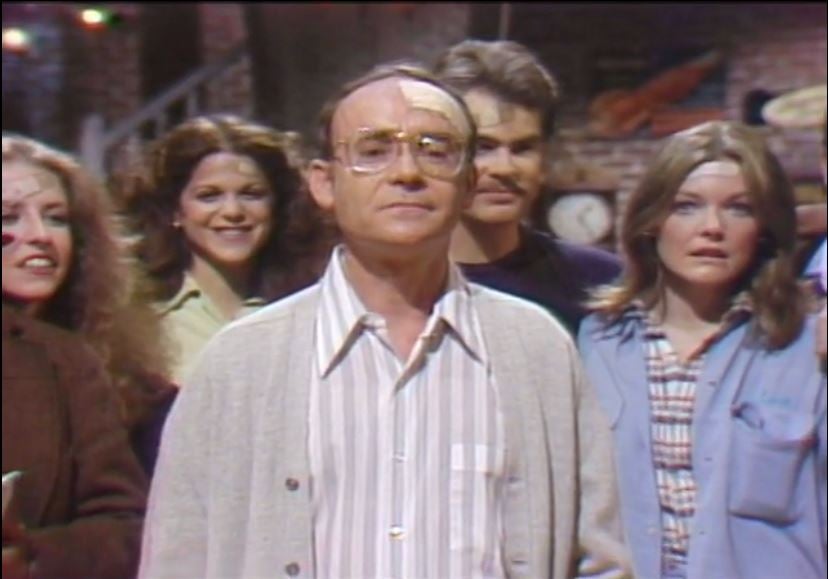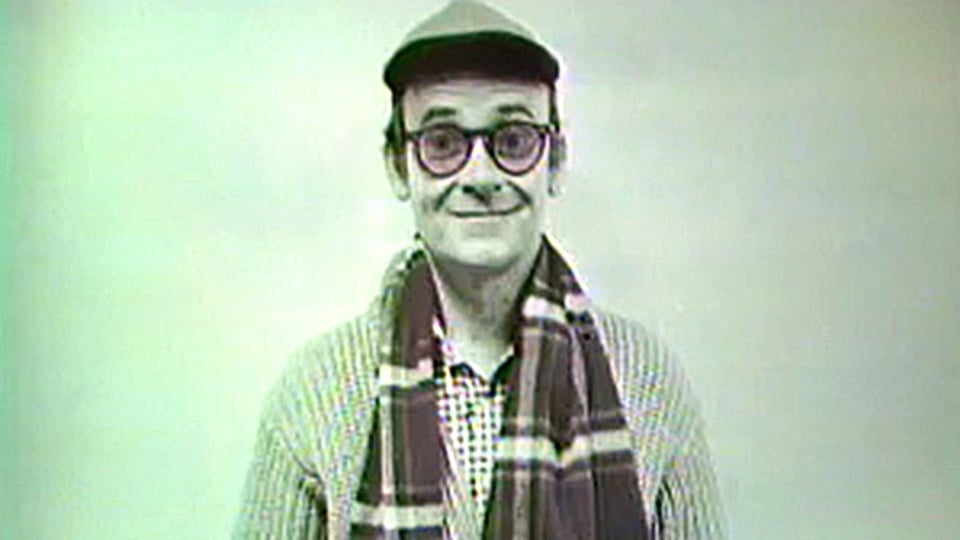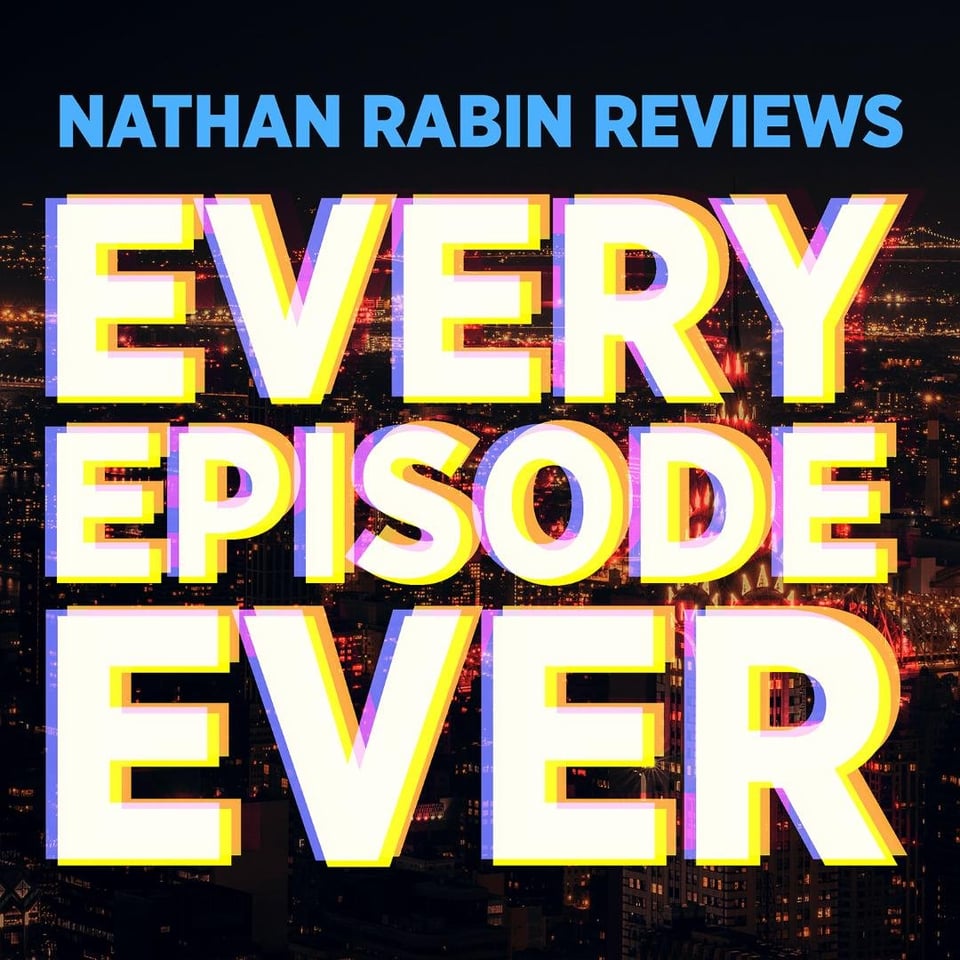October 30th, 1976, the host is Buck Henry and the Musical Guest is The Band

Here's some stuff that happened in the past

We've talked a lot about firsts here at Every Episode Ever. That makes sense, considering how new the show was at that point. But it was old enough to have logged some meaningful endings, whether audiences knew it or not.
Two staples of Saturday Night Live's endlessly mythologized beginnings ended when Jim Henson's Muppets appeared in their final sketch and, on a more auspicious note, the last short film from Albert Brooks ran.
The sixth episode of the second season of Saturday Night Live marked one of the most important farewells in the show's history, if not the history of television itself. This was the final show with Chevy Chase as a cast member.
It's a transition celebrated in a "Weekend Update" bit where Jane Curtin, who would be taking over as anchor, jokes bitterly about Johnny Carson stepping down and Chevy Chase taking his place so he could spend the next decade having meaningless conversations with vapid celebrities.

Chase had so much heat at that moment that many genuinely thought Chase would take over for Carson when he eventually retired. Seemingly anything seemed possible for Chase. Movie stardom seemed inevitable. How could someone so handsome, tall, funny, and seemingly charming fail as a silver-screen idol?
Alternately, Chase could go solo and become a television force on par with Carson. The world was full of temptations for a coke-snorting narcissist with a famously terrible personality, but it would puzzlingly take years before Chase made a proper debut as a cinematic leading man with the 1978 hit Foul Play.
Brooks is the greater artist, but Chase had a much more profound impact on Saturday Night Live. He was its first breakout star and its first "Weekend Update" anchor.
He was the first cast member to do so well on Saturday Night Live that he quickly became too big for the show. Saturday Night Live became a training ground for the stars of tomorrow. Chase was its first breakout star in the sense that he felt the need to break the hell out of the show and start accepting all of the money, opportunities, and cocaine that the world was sending his greedy little way.

This episode is notable for other reasons as well. Saturday Night Live has been lionized and romanticized for being dangerous and edgy when it's actually pretty safe and always has been. This episode was dangerous and edgy in the most literal sense in that the edge of John Belushi's Samurai sword penetrated poor Buck Henry's skin, and he had to perform the rest of the night with a big bandage over his eyebrows.
The whole cast shows up bandaged in solidarity with Henry's very public injury in the end credits, where they all fall down, ostensibly in homage to the show's departing king of pratfalls.
It was very gracious of the cast to pretend they didn't hate Chase. It couldn't have been easy.
In a monologue that has aged like the stinkiest cheese left out in the blazing sun, Henry refutes the idea that the Not Ready for Prime Time Players aren't the crazed libertines of the public imagination.
He then goes on to list their quirks: Jane Curtin is in an abusive marriage, Gilda Radner is having sex with her brother, Garrett Morris eats white people, Danny Aykroyd sleeps with a bicycle chain in his mouth, and keeps a goat in his office, and Laraine Newman has been with hundreds of men who have hurt her.
As for Chase, and I hope you're ready to laugh, he's supposedly leaving Saturday Night Live so that he can be gay and do sex stuff.
For a show that strived to be edgy, Saturday Night Live's attitude towards homosexuality seemed to be child-like tittering at its mere existence. "Wouldn't it be weird and funny if someone was gay?" is the core premise behind way too many early sketches.
Elsewhere, "Weekend Update" performs its civic duty by running footage of Gerald Ford pardoning Richard Nixon in its entirety just before the 1976 presidential election.
It was the show's way of reminding a forgetful young audience that Ford did something much of the public considered craven, cowardly, and wrong when he freed Tricky Dick from the consequences of his actions.
There are, of course, no jokes in the pardon. Would it have killed Ford to have thrown in a gag or two? Reagan would have at least three or four zingers prepared for the occasion.
Aykroyd seems like the kind of brilliant weirdo who would take auctioneer classes to get good at speaking quickly and not because he wanted to be an auctioneer.
Aykroyd is joyously in motor-mouth pitchman mode when he shills for a hilariously spooky variation on the Bass o Matic, only instead of turning fish into an inedible sludge, the Bat-O-Matic blends the insides of bats for the witch or warlock on the go.
It's an inspired twist on one of Aykroyd's perennials and appropriate for the show's Halloween episode.
Garrett Morris gets two showcases that, unfortunately, highlight the show's problems with race. In one, he retraces his roots back to a woman who the signers of the Constitution gang-raped. This leads to a series of fake mixed-race relations played by Morris, either in a dress or whiteface.
Say what you will about Lorne Michaels and blackface, but on more than one occasion, he also employed whiteface to make a black cast member look white as well.
In an even more unfortunate development, Morris plays a "Weekend Update" correspondent who is so scared to see Harry Houdini's ghost that it makes his hair stand on its end.
It's blatant minstrelsy from a show that was already chasing laughs by putting an under-served black cast member in a dress.
Amidst all this madness, the episode somehow finds space for The Band to perform four songs, including "Georgia On My Mind" and "The Night They Drove Old Dixie Down."
This was a historic episode. It was the end of the Chevy Chase era. A few episodes later, Bill Murray, joined the cast and had an even more significant effect on pop culture that would eclipse even that of the rising star he was replacing.
Grade B
Best sketch: Bat-O-Matic
Worst Sketch: Roots
You just read issue #40 of Every Episode Ever. You can also browse the full archives of this newsletter.
-
Oops, so THIS was the episode with Samurai Deli, the aforementioned sketch in which Belushi very nearly stuck his sword through Buck Henry's skull. I mistakenly thought it was an earlier Buck Henry episode. (Crazy how many times Henry appeared in such a short span.)
-
↳ In reply to Johnny Socko
"Samurai Delicatessen" was in Buck's first appearance in January '76, so you were right about that. This one's "Samurai Stockbroker."
("Samurai Deli" famously - hell, legendarily - contains a much better example of Belushi's swordsmanship, where he throws a tomato in the air and slices the damn thing clear in half. IN MID-AIR. ON LIVE TV. The man had control, when he was in control.)
Add a comment: